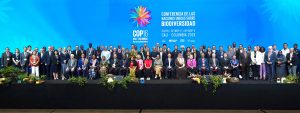At COP16 to the biodiversity convention, small-scale fishers from all over the world lobbied for an approach based on human rights to marine biodiversity conservation
This article is by Vivienne Solis Rivera (vivienne.solis.rivera@gmail.com), CoopeSoliDar R.L., Costa Rica and Member, ICSF
Wearing T-shirts emblazoned with important messages for small-scale fisheries (SSF), artisanal fishers from all over the world gathered recently to press for their governments to embrace a human rights-based approach in the implementation of the Kunming-Montreal Global Biodiversity Framework (KMGBF) during the sixteenth meeting of the Conference of the Parties (COP16) to the Convention on Biological Diversity (CBD). Their messages included ‘No to the Blue Economy’, ‘Human rights before conservation’, and ‘Biodiversity framework can’t be achieved without us’.
CoopeSoliDar, a Costa Rica-based co-operative of professionals interested in establishing bridges between conservation and development, primarily for local communities, supported the participation of a group of small-scale fishers to the multi-stakeholder dialogue convened ahead of the COP by Swedbio and other organizations. From the first day, CoopeSoliDar reminded the COP presidency, Colombia, of the importance of taking into account the implementation of the Voluntary Guidelines for Securing Sustainable Small-scale Fisheries in the Context of Food Security and Poverty Eradication (SSF Guidelines), approved by governments at the Committee on Fisheries (COFI) of the Food and Agriculture Organization of the United Nations (FAO) in 2014.
With the support of Swedbio, CoopeSoliDar and the ICCA (Indigenous Peoples and Community Conserved Territories and Areas) Consortium organized a capacity-building space for small-scale fishers in order to reach a common understanding of fisheries issues at stake at the COP. The encounter enabled an informed, organized and visible participation of fishworkers in the conference’s strategic spaces.

Artisanal fishermen and fisherwomen from indigenous peoples, Afro-descendant peoples and local communities joined efforts in order to include the SSF Guidelines for discussion on item 20 of the conference agenda, about marine and coastal biodiversity.
Jesus Chavez, a fisherman from the North Caribbean coast of Costa Rica and co-coordinator of the Marine Areas of Responsible Fishing and Marine Territories of Life Network, highlighted the importance of enforcing the right to free, prior and informed consent before governments create new marine protected areas (MPAs), and respecting local governance models, such as Costa Rica’s Marine Areas of Responsible Fishing, under which local communities have managed to keep their access to the sea and fishing resources, consequently defending their marine territory of life.
The group of fishermen and fisherwomen participated proactively in the discussions on the KMGBF’s Target 3, sharing the reality in their territories and urging everybody to recognize the contribution of SSF to marine conservation and the right to information.
It was the first time that a delegation of nearly 30 small-scale fishworkers and supporting organizations were able to make progress towards effective and inclusive participation in the Convention. A press conference on SSF was also organized to highlight the sector’s links with the Convention and, in particular, with KMGBF. Members of the delegation also participated in a wide range of side events, meetings and negotiations in the COP16 Blue Zone and Green Zone, also known as the people’s COP.
The delegation visited various negotiating groups, such as the Women’s Caucus, a very important platform to lobby for the rights of women in marine, coastal, continental and wetland fisheries. Fair and equal access to land tenure and decent work was considered key for small-scale fisherwomen. This is already reflected in GBD’s Target 23 and it is essential for empowerment and for making women visible in decision making at local, national and global levels.
The fisherwomen participated in debates on the role of human rights in ecosystem restoration and the importance of SSF support networks to encourage a change in perceptions around traditional knowledge, mechanisms of prior, free and informed consent and other instruments such as the SSF Call to Action or the SSF Guidelines. While it was felt that the guidelines certainly approach gender issues, an effective implementation that takes into account monitoring and funding is necessary, it was also pointed out.
COP16 made important decisions for indigenous peoples, local communities and peoples of African descent. During COP16 the sector strongly advocated for the creation of a subsidiary body of the Convention that would, in the process, establish a permanent space for representation.
COP16 approved the creation of the Subsidiary Body of Indigenous Peoples, Local Communities and Afro-descendant Communities, which should include small-scale fishers in its conceptualization. The permanent subsidiary body becomes the main advisory body on topics concerning indigenous peoples and local communities under the Convention. Given the current focus of the parties to the agreement on marine conservation, it is expected that the new subsidiary body will bring to the table the interests, participation and needs of the small-scale fishermen and fisherwomen who belong to these communities.
Ramiro Batzin, chair of the indigenous caucus (the International Indigenous Forum on Biodiversity, precursor to the recently approved subsidiary body), talked to the delegation of SSF representatives and expressed great interest in establishing contacts in order to integrate their interests beyond COP16. While it is important to acknowledge that the new body includes small-scale fishing communities, it is worth highlighting that their representatives are now better prepared to participate in decisions concerning their work, marine conservation and the sustainable use of fisheries in their territories.
CoopeSoliDar feels that COP16 brought hope for progress in the local implementation of KMGBF, so that the real stakeholders see its good intentions become tangible in their territories. The conference also highlighted the importance of having community stakeholders present, in an informed manner, in international fora.
For more
The SSF Call to Action
https://www.ssfcalltoaction.org/
CoopeSoliDar
https://coopesolidar.org/
Sixteenth meeting of the Conference of the Parties to the Convention on Biological Diversity, 21 October–1 November 2024 – Cali, Colombia
https://www.cbd.int/meetings/COP-16